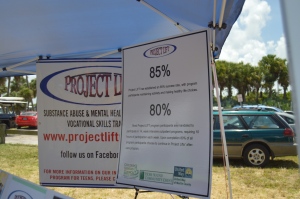Why we need to do better with Mental Health. We need to listen to John Oliver.
I believe this. I believe that every day we wake up and we do the best we can. I don’t think any sane person wakes up and says “Hey I’m going to be a terrible person today.”
People with mental illness do not have a choice. Most of them do not get the care they need. Even when they get care they don’t get the care they need most of the time. They get medications that could be helping or not.
At our local mental health center when you finally get in you get 15 minutes with a person whose only job it is to write you a prescription.
A few years ago for weeks I faxed someone there with no answer. For weeks. Every week I sent this person an FYI fax. The day she was leaving she called me. As it turned out we knew each other and she worked as a psych nurse in the program I ran years ago down in Boca. She said this to me. “Let me give you a little advice! No one will ever call you back. Even if you have releases. The practitioner’s only job is to write prescriptions every fifteen minutes. They are not allowed to call you back.”
So here I am out in field and I can’t communicate with the person who write the prescriptions. There is no continuum of care.
There is no care.
Last June a friend of mine contacted me. She had terrible anxiety and depression. She had tried an antidepressant before and didn’t do well. I suggested to her there are all kinds of antidepressants. To call her PCP and talk to him. She called and could not get an appointment until the next September. She finally got a prescription from another one of her doctors and is doing great.
I have a friend who has a son. A really good kid. As a teen he was experimenting and just like any parents nightmare he took one of those designer drugs. I can’t remember the name. They are all awful.
This stuff fried his brain. He ended up at the local (same one!) community mental health center. He was diagnosed with schizophrenia. Placed on a bunch of antipsychotics. He was zombie. He couldn’t work really. He went to work with him mom but couldn’t even last the day.
I met them at our local Reiki Circle. This is a really good kid. A bright light under all that mess. A good soul. I spent some time with him and his mom. He loved Reiki. I asked some questions. Is there a family history of schizophrenia? No Was there any signs of mental illness before he took this drug? No. He was a normal kid.
Now granted it can happen and this kind of event can bring it out.
I just felt like the 15 minute old doctor was wrong and I encouraged her to bring him to the University of Florida. She did. They did a bunch of tests. Like me. They said he’s not schizophrenic. They put him on one antidepressant. He still has anxiety. They put him on another antidepressant. I pray someday he’ll be ok. That his brain will be unfried.
I encouraged the mom to continue to bring him to Reiki which they both enjoyed and if she could afford to take him to our marvelous community acupuncture program that we are so lucky to have.
I see him in our neighborhood. He has dog walking business. He always gives me a hug and says “thank you.” I leave in a puddle of tears.
I always encourage him. He is a great kid.
He has a great mom. She really believed in him. Som
Last week there was another shooting. Another mentally ill person. The same thing. The pro gun people come and drown out the people who want more mental health services and nothing is done.
It will happen again.
I don’t want to have this conversation anymore. About guns. About how the GOP is trying to take my free speech away and tell me I can’t ask a patient if they have gun. Who does that?
I’m not even going off on that rant. You cannot talk to people who apparently having difficulty processing information. These people are destroying us with their BS rhetoric.
You want people to work. You help them get well. Because they want to work. Because no one wakes up in the morning and says “I want to be disabled. I want to collect SSDI. I want to worry about where my next meal is coming from. I want to be alone. I want to isolated. I want to be mentally ill.” No one.
Let’s start here.
Let’s watch this fabulous piece by John Oliver together and talk about that. Because John is saying everything I’ve said to all of you.
“In 2013, an estimated 43.8 million adults in the US had any mental illness.
10 million people suffer from serious mental illness.
John talks about how JFK mandated the state mental Hospitals get shut down and he is right when he says we never followed thru with the funding for community mental health.
Many are being place in nursing homes. They send people on a “greyhound” to someplace else so far away they can be admitted to that facility again.”
I want to thank John Oliver from the bottom of my heart. Just yesterday for some reason Dr Phil was on my tv. He was berating this person that was delusional. So now America will think that people can talk themselves out of delusions. I didn’t see the beginning so I have no idea what the background is. I don’t know if this kid is on medications. All I know is this baffoon is standing in my tv giving this kid advice. Maybe it good and maybe it’s not. But what is the take away? The take is people can talk themselves out of their delusions which is not true unless your Dr Phil.
Now lets take this situation and think about this. Your mentally ill loved one ended up in a jail in Florida where he has a broomstick stuck up his butt. Imagine that is your child.
It’s unimaginable.
Unfortunately its true.
I’m going to go even further and say there are a lot of people out there that are mentally ill that could be a lot better. With the proper diagnostic care , some creatively, and community followup they could go beyond the community home they live in (If they are lucky enough to live in a place like this.) and function in the world. Have jobs. Relationships. Like every one.
Because they are like everyone except they have chemistry issues.
They could have a life.
I hope you take the time to read this blog. If you live someplace with cool mental health solutions I would love to hear about it.
Here are some other posts I’ve written on the subject.
https://cyndi-lenz.com/2015/05/11/the-asylum-life-house-on-the-hill/
https://cyndi-lenz.com/2015/05/07/dorothea-dix-psych-nurse-and-social-reformer/












